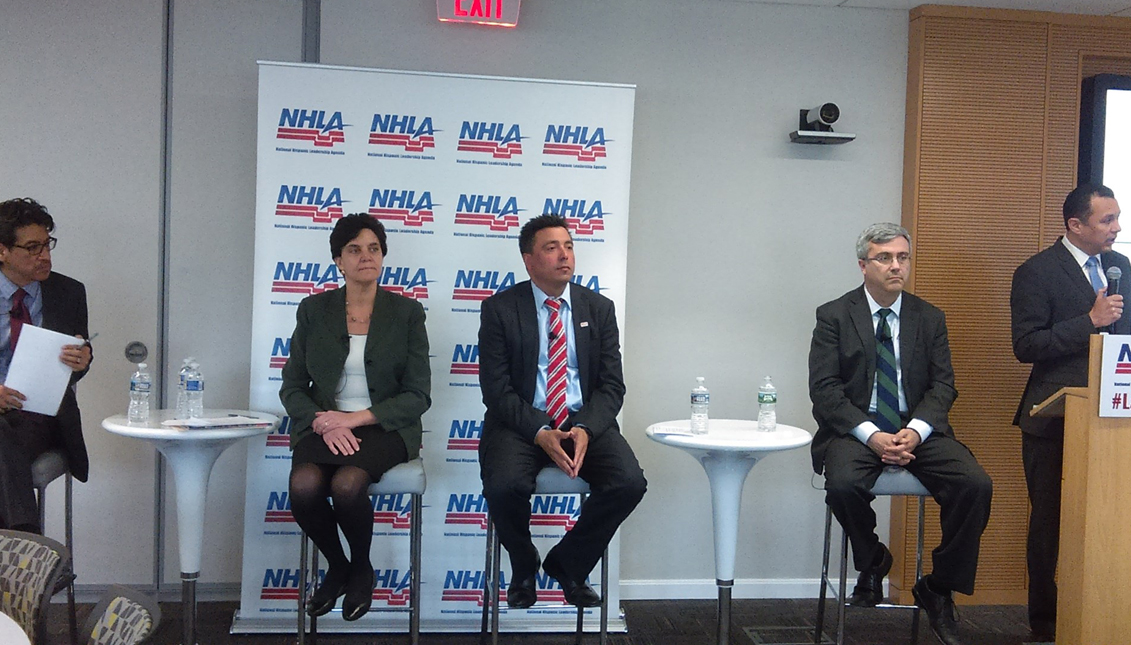
A Closer Look At A Hispanic ‘Blueprint’ For The Future, Part 1
More details and policy recommendations proposed by the National Hispanic Leadership Agenda (NHLA), a coalition of 40 Latino organizations.
Calling int a “blueprint for advancing the Hispanic community,” NHLA’s public policy agenda covers 10 topic areas of interest to Hispanics: Economic Security & Empowerment, Education, Immigration, Government Accountability, Civil Rights, Environment and Energy, Health, Puerto Rico, Latina Rights & Well-being, LGBTQ Rights and Well-being.
Below is a look at the policy recommendations for five of the topics - Economic Security & Empowerment, Education, Immigration, Government Accountability, and Civil Rights.
- Expand workforce opportunities
- Improve working conditions
- Promote policies that reward work
- Enhance financial access and protect consumers
- Increase retirement security
- Support affordable rental and homeownership.
- Support Latinas in the workforce
- Increase the federal minimum wage to $15 per hour by 2024
- Institute universal pre-school and expand existing Head Start programs
- Establish goals to reduce student achievement gaps across multiple measures and require remedies focused on reducing student achievement gaps.
- Provide greater resource equity to address academic disparities.
- Strengthen higher education financial aid programs
- Increase funding for Hispanic-Serving Institutions (HSIs) and college preparatory programs.
- Ensure for-profit institutions meet gainful employment standards. Incentivize community colleges to transfer more students of all backgrounds to a four-year institution
- Reform overly harsh school discipline policies that lead to suspension, expulsion, or criminalization.
- Reverse orders by the Attorney General and new proposed regulations that make establishing gender-based violence or gang violence-related asylum claim more difficult
- Stop states and localities from enforcing federal immigration laws.
- Lower naturalization fees and reduce processing times for applications.
- Expand adult English language and civics education.
- Provide funding for the U.S. Citizenship and Immigration Services’ Office of Citizenship’s integration programs, as well as allow it to accept private funds.
- Grant the right of naturalization, including retroactively, to all farm workers and other essential workers working in the United States during the COVID-19 crisis and provide employers immunity from adverse action for employing those essential workers, if they were undocumented.
- Reverse exorbitant spending on border enforcement.
- Replace National Guard troops with properly trained civilians.
- End racial profiling.
- Limit the geographic range of U.S. Customs and Border Protection activity.
- Halt the construction of walls along the border
- Ensure that children in detention centers are released in compliance with the Flores agreement and provided an opportunity to remain with their parents or other relatives.
- Develop, fund, implement, and enforce a pipeline program for Hispanic candidates into GS-12 through GS-15 senior positions, to include the career Senior Executive Service (SES) and Candidate Development Programs.
- Increase cooperation with Hispanic organizations that promote Hispanic hiring and training through memorandums of understanding and partnerships.
- To increase federal contracting opportunities for the thriving Latino-, and particularly Latina-, owned small business sector, the federal government should:
- Take steps to increase Hispanic participation in the 8(a) Business Development Program.
- Increase the number of Hispanics serving as Small Business Directors in the top 25 agencies.
- Implement the White House’s Small Business Federal Contracting Task Force recommendations.
- Improve small business contracting opportunities in general.
- Oppose excessive documentary requirements that disenfranchise Latino citizens.
- Support same-day registration and early voting options.
- Ensure federal investigations and prosecutions of voter discrimination.
- Expand absentee and early voting to protect higher-risk populations from COVID-19.
Census:
RELATED CONTENT
- Oppose any effort to exclude non-citizens from the total population count used to apportion congressional seats and votes in the Electoral College.
- Ensure that the Census Bureau increases Latino representation in its workforce, enhances its engagement with Latino stakeholders, strengthens its linguistically and culturally appropriate outreach, and includes Puerto Rico in all of its data sets.
- Protect door-to-door Census data collectors from spreading COVID-19 in low-income communities that did not complete the Census online
- Provide an extended time period to complete the census if necessary due to the impact of the pandemic.
Criminal Justice
- Reform policing to address issues of systemic racism and excessive use of force.
- Reduce the number of people in local jails, state, and federal prisons to stop the rapid spread of COVID-19 among incarcerated people.
- Require law enforcement to better report statistics on hate crimes, and require social media platforms to combat the dissemination of hate and White nationalist rhetoric.
- Adopt guidelines from the American Bar Association (ABA) on a uniform Spanish translation of Miranda rights for Spanish dominant persons.
- Restore the right to vote and access to federal financial aid to all persons regardless of convictions, and reduce the criminal bars to naturalization.
- Require ethnic and racial classifications in all relevant criminal justice data collection.
- Implement pre-trial reforms that reduce excessive bail, bonds, and civil forfeiture.
- Enact trial and sentencing reforms to diversify juries and reduce overly harsh sentences.
- Improve educational, employment, and civic engagement opportunities for the re-entry population.
- Reform juvenile justice systems to break down the school-to-prison pipeline
Judiciary
- Confirm judges who have demonstrated records of preserving or expanding civil rights protections and who reflect the country’s growing diversity, and improve the representation of Hispanics in the federal judiciary.
- Reject any representations that judges of Latino ancestry are somehow biased and unfit to serve on the judiciary or preside over specific cases.
Language and integration
- Oppose legislation to establish English as the national language and other measures that discriminate against language minorities.
- Support “English-Plus” legislation and language assistance standards for those with limited English proficiency skills receiving federally supported services.










LEAVE A COMMENT: